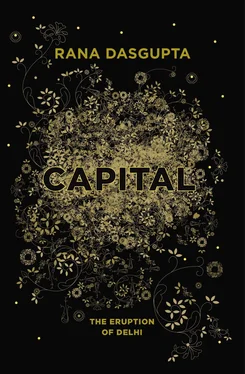She sends another message.
“Can we have lunch tomorrow?”
He sighs, and with a great effort acquiesces. “OK,” he writes back.
“But you won’t be in Mumbai tomorrow,” I say.
“I know,” he says. “I’ll cancel it in the morning.”
There is a long silence. It’s nice out here in the park. The suffocation of the city abates somewhat.
“What was the most beautiful moment in your life?” I ask him.
“When I was seventeen. I gave up my studies to go to Bombay and be a film star. I had a Muslim girlfriend who was perfect. She used to cook me breakfast every day. But then we ran into the Hindu — Muslim problem and now she’s married to someone else. Those were beautiful days. I was modelling, I was working out every day, doing martial arts, I looked good. One day I was walking down the street and a big Lexus SUV pulled up next to me. The back window went down and inside was Sanjay Dutt. The movie star. He looked at me and without saying anything he saluted me. For my physique.
“I still want to be an actor but you need money for it. You need a lot of money to get into that business.”
It’s true that Anurag has an impressive physique. Still not thirty, he is tall and powerful. He has a thick mop of black hair. Were it not for a slight maladjustment he would be a strikingly beautiful man. But there is something bitter in his regard which means that he just misses. He looks shifty and ill at ease.
We’ve been drinking for a couple of hours, and the Coke is finished. We gather up the bottles; we leave the remaining rum with the watchman. We walk back through the park and climb over the fence, more unsteady than when we arrived. We find my car, which Anurag unlocks proprietarily, and we drive away. A few minutes later, Anurag stops by the side of the road and asks me to wind down the passenger window. He whistles out of it and two dogs immediately come bounding out of the trees. They put their paws on the window ledge and crane their heads into the car. Anurag reaches out to them. The dogs are hyperventilating with excitement. He strokes them and they lick his hand.
“These are two of my favourites,” he says.
He tells them he has to go and that he’ll visit them soon. As we drive away he is dialling a number.
“I’m trying to call the guy in my company. He’s forty-two and he manages money for many Congress politicians. You can speak to him. He works in India but he has a US phone number. Imagine that.”
He listens to the phone but there’s no response.
“He doesn’t always pick up,” says Anurag. And, by way of explanation, “He’s a little diabetic.”
The fact that it is after one in the morning might also have something to do with it.
He pulls up at a roadside kebab place that is still open. There are a few plastic chairs arranged on the sidewalk but Anurag doesn’t want to get out of the car because we can’t drink there. He summons the waiter by flashing his lights on and off: the horn on my car is broken. The waiter comes over with a menu limp from many late-night hands. Anurag orders paranthas for us and kebabs for some of his canine friends.
“Make them without spices,” he says.
He winds up the window, inserts two plastic cups into the car’s holder, and pours us both neat vodka. His phone rings: it is his colleague returning his call.
“I wanted to introduce a friend of mine,” says Anurag into the phone. “He’s British. He needs a big loan for his business.”
He thrusts the phone into my hand. The man on the other end speaks well and quickly. He asks me nothing about myself and yet speaks as if the deal is already done.
“We can provide excellent terms in the UK,” he says. “Through one other company we can give you funding anywhere else in the world too. So just tell Anurag how much you need and we’ll take this forward.”
“Okay,” I say.
Anurag takes the phone back and speaks into it.
“I have good news,” he says. “I bagged a Kolkata company. Their business is grain and they need 1,000 crores [$200 million]. Yeah it’s signed.”
As the conversation ends, the waiter comes over and Anurag winds down the window. Hot food is passed inside. We begin to eat.
“So you know why I gave you the phone?” Anurag says. “I need your help. You have contacts in London. When I start making big money I will need to expand overseas. I’ll need your help to talk to those people. We’re going to lend this Indian money all over the world.”
I tell him I hope he takes me out when he gets rich. I’d like to see what it looks like. Half of me feels he will spend the rest of his life imagining his future windfall while living off the dwindling rent from his property. Another half believes he may be the kind of nondescript guy who, against all probability, lands something astonishing. It’s the kind of thing that can happen here.
We pay up and set off for Anurag’s house. As we pull up outside, six dogs come running to greet him. He gets out with the packages of meat, opens up the foil and lays them on the ground. The dogs set to eating, and he strokes them.
“Look at them,” he says. “They’re so innocent.”
I bid him goodbye. He enfolds me in his arms. I get back in the car, jerking the driver’s seat forward so I can reach the pedals, and set off for home. I have a vivid dream that night about enormous piles of dead dogs being incinerated in a Gurgaon corporate office.
The next morning, Anurag calls me.
“Did you really like my idea about the house?” he asks. “Or were you just saying that not to hurt me?”
“I don’t think it will ever work,” I say.
“No,” he says. “Maybe not.”
Delhi has a hacked-off parentage, breeding orphans out of its baked land.
Uprooted from the maternal solace of history and tradition, it has grown to abhor its father figures — politicians, bureaucrats, and all those cynical patriarchs of money and the market — and even real-life parents have grown remote with the jolts and ruptures of break-neck change.
Like an orphanage, the city suffers from a bewilderment of origins and direction. It is shaken by tics and tantrums. It cries out for the relief, on its shoulder, of a tender parental hand.
But once in a while, an orphanage produces beings who are preternaturally free. Never having known the corrosion of parental authority and expectation, such individuals assemble a universe for themselves, and dazzle all around them with their originality, curiosity and wisdom. They do not accept the fossilised judgements of others, and they bring wondrous possibility to the staidest of systems.
In this respect, too, Delhi resembles an orphanage. It can spawn people who seem entirely unconstrained by how a particular problem has been dealt with before, people who can imagine a myriad of ways in which the world might be differently organised. People who transcend the general self-involvement and who see immediately, in the adjacent and particular, the planetary extension. It is in these people that I find Delhi’s utopian potential.
One of these resplendent individuals is Anupam Mishra,* with whom I now stand looking out over the Yamuna river.
It is a hot day and we both carry drinking water. I have a litre bottled for me by the Coca-Cola Company and purchased just now from a roadside stall. Anupam has brought a flask from home, which hangs on a strap around his neck. Seventy years old, with a shock of grey hair, he wears a brown kurta, which hangs loosely around his slender frame; on his feet are leather sandals.
We are on the stretch of land where there was, until its demolition before the Commonwealth Games, a large and vibrant township, home to a few hundred thousand people, among them the residents of Bhalswa Colony whom we met earlier. The area is dominated, now, by two enormous sports stadia — and by the new Delhi Secretariat building, which houses the city’s government. This building is in two wedge-shaped halves standing at an angle to each other, whose shining surfaces look out over the river like two glass eyes — and indeed the entire complex could not be more blind to the river estuary that sweeps before it. A few metres away, where the Yamuna’s flood plain begins, there is a hint of Delhi’s primordial landscape: tufted grasses line the water, some three metres high, and cormorants spread wet wings in the sun — but it is as if this suggestion of nature is abhorrent to those who have seized this land for their modern-day forts. High walls surround every building, and the enormous area has been paved with concrete paving bricks, as if someone were worried about some vegetable invasion; these bricks store so much heat on a day like this that pavement dwellers must pour bottled water on them just so they can sit.
Читать дальше











